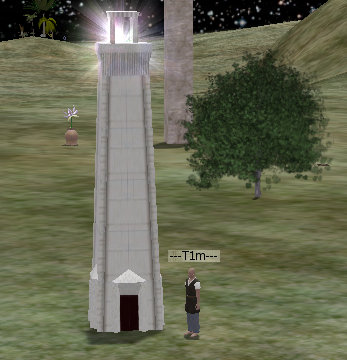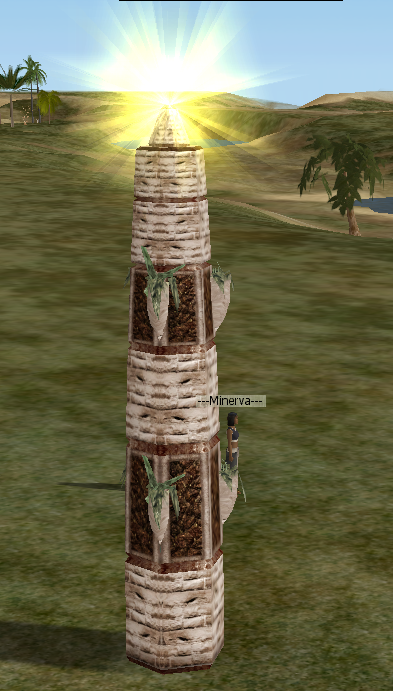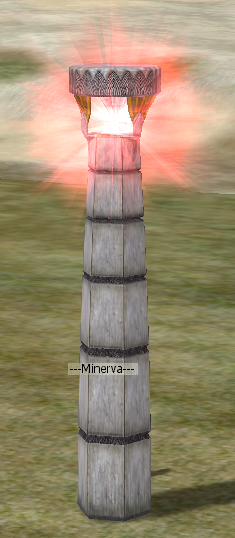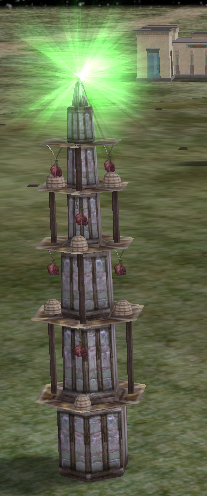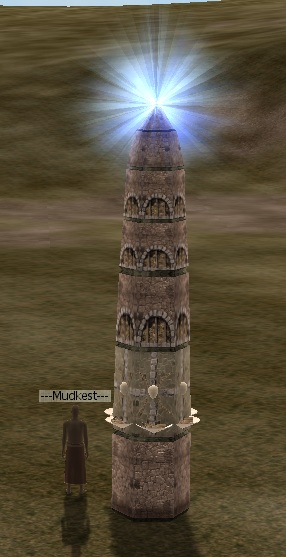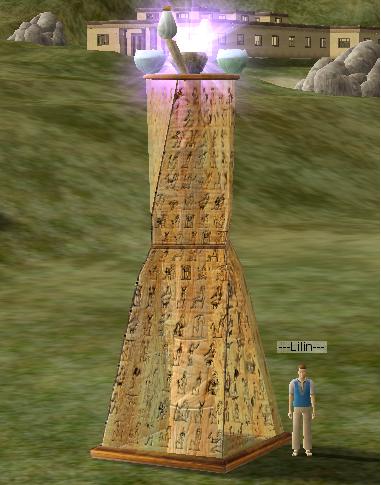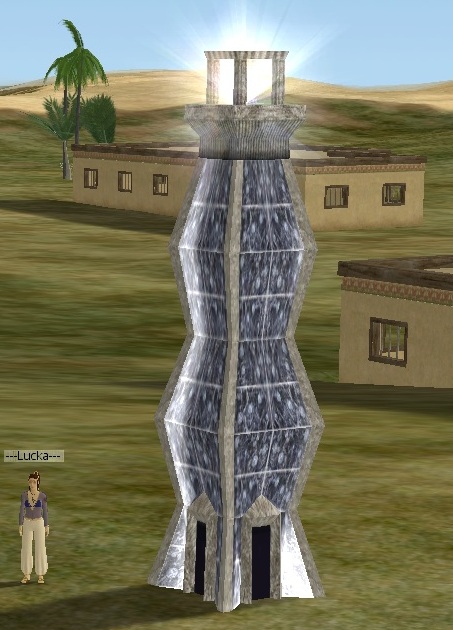The Wiki for Tale 6 is in read-only mode and is available for archival and reference purposes only. Please visit the current Tale 11 Wiki in the meantime.
If you have any issues with this Wiki, please post in #wiki-editing on Discord or contact Brad in-game.
Test of Towers
| English | Deutsch | français | magyar | Türkçe |
| Test of | |||
| Towers | |||
| Discipline | |||
| Requirements | |||
| |||
| Principles | |||
| |||
| Demonstration | |||
| |||
The Test of Towers is a test in the discipline of Architecture. During periodic pre-determined "Tower Hours", you (and others willing to help you) will construct temporary towers to "control" the land. Building more towers than other players, and placing them strategically, is the key to controlling more territory, bringing you greater progress toward passing the test.
University Text
- The Hour of Towers occurs about once per three (Egypt) days. The schedule for the next seven Hours of Towers is shown on the calendar. When the hour arrives, build any number of Towers across the land. You control all land that is closest to one of your towers. Control an amount of land equal to all of Egypt to pass the Test of Towers.
- Hint: Since you only have 20 minutes to place your towers, contract with others to build for you. Be sure to transfer ownership before the end of the Hour of Towers.
Building Towers
Each Hour of Towers uses just one of the seven types of towers. At the end of the hour, all towers disappear. Tower Hours last for one in-game hour -- which is to say, about 20 real-time minutes.
Towers are built in a Medium Construction Site (2 canvas, 8 rope) and are only available on the build menu during one of the hours for that type of tower. If you fail to load the required resources onto the construction site before the period ends, your construction site remains; you may disassemble it to get your resources back.
Scoring
Any towers you own at the end of the hour count towards your cumulative total control of Egypt. (This means that you can have other people build towers for you, as long as they transfer ownership to you before the end of the hour.) The percentage you earned during that hour will be shown in a message in Main, and the top 14 scores will be listed in a message in System.
The top 14 scorers in any particular Hour of Towers get to apply all of the percentage points they scored that round to their total. Participants not in the top 14 only get to add 1/7 of their percentage points to their total.
Your total cumulative score so far can be viewed from your Tests menu. When your cumulative score reaches 100%, you pass the Test of Towers.
Passing the Principle
Principle is satisfied when you have built two towers (must be different types) and have successfully controlled 7% or more of Egypt.
Tower Types
There are seven kinds of towers. Each type requires a demonstration of materials. All types are now unlocked.
Solid Land Tower
- Medium Construction Site
- 1000 Bricks for Structure
- 1 Clay Lamp for Illumination
- 10 Cut Stones for Reinforcement
- 20 White Sand as an Offering
- 7 Medium Quartz for the Beacon
Rich Soil Tower
- Medium Construction Site
- 1000 Bricks for Structure
- 1 Clay Lamp for Illumination
- 20 Onions as an Offering
- 20 Carrots as an Offering
- 20 Cabbage as an Offering
- 20 Leeks as an Offering
- 20 Garlic as an Offering
- 50 Saltpeter as Enrichment
- 7 Medium Topaz for the Beacon
Hand of Man Tower
- Medium Construction Site
- 1000 Bricks for Structure
- 1 Clay Lamp for Illumination
- 100 Ash to demonstrate life's end
- 250 Firebricks to show Permanence
- 50 Charcoal to show man's control of nature
- 4 Iron Bars to show Strength
- 7 Medium Ruby for the Beacon
Living Land Tower
- Medium Construction Site
- 1000 Wood for Structure
- 1 Clay Lamp for Illumination
- 70 Dates, sweet gift of Flora
- 280 Honey, sweet gift of Fauna
- 7 Medium Emeralds for the Beacon
New Life Tower
- Medium Construction Site
- 1000 Bricks for Structure
- 1 Clay Lamp for Illumination
- 7 Eggs as Offering
- 1 Onion Seeds as Precious Gift
- 1 Carrot Seeds as Precious Gift
- 1 Cabbage Seeds as Precious Gift
- 1 Leek Seeds as as Precious Gift
- 1 Garlic Seeds as as Precious Gift
- 7 Medium Sapphires for the Beacon
Racing Mind Tower
- Medium Construction Site
- 1000 Bricks for Structure
- 1 Clay Lamp for Illumination
- 100 Papyrus Paper, showing Contemplation
- 1 Nut's Essence, showing Daring
- 3 Quicksilver, showing Haste
- 1 Lens Amethyst for the Beacon
Night Tower
- Medium Construction Site
- 1000 Bricks for Structure
- 1 Clay Lamp for Illumination
- 70 Slate as Barrier
- 2 Night Granite as Shield
- 3 Peasant's Foot Mushrooms as Offering
- 3 Toad Skin Mushrooms as Offering
- 3 Sand Spore Mushrooms as Offering
- 3 Earth Light Mushrooms as Offering
- 3 Eye of Osiris Mushrooms as Offering
- 3 Bleeding Hand Mushrooms as Offering
- 3 Dung Rot Mushrooms as Offering
- 7 Medium Diamonds for the Beacon
Monumental Towers
As a reward, once you've passed the test, you can build monumental towers. They look the same as the standard towers, but they don't disappear. You may only build one monumental tower of each type. After building, you can reposition them once.
Rich Soil (after you get 100%)
- Medium Construction Site
- 7000 Bricks for Structure
- 7 Clay Lamp for Illumination
- 140 Onions as an Offering
- 140 Carrots as an Offering
- 140 Cabbage as an Offering
- 140 Leeks as an Offering
- 140 Garlic as an Offering
- 350 Saltpeter as Enrichment
- 28 Medium Topaz for the Beacon
Solid Land (after you get 110%)
- Medium Construction Site
- 7000 Bricks for Structure
- 7 Clay Lamp for Illumination
- 70 Cut Stones for Reinforcement
- 140 White Sand as an Offering
- 49 Medium Quartz for the Beacon
Hand of Man (after you get 140%)
- Medium Construction Site
- 7000 Bricks for Structure
- 7 Clay Lamp for Illumination
- 700 Ash to demonstrate life's end
- 1750 Firebricks to show Permenance
- 350 Charcoal to show man's control of nature
- 28 Iron Bars to show Strength
- 28 Medium Ruby for the Beacon
Living Land Tower (after you get 200%)
- Medium Construction Site
- 7000 Wood for Structure
- 7 Clay Lamp for Illumination
- 49 Medium Emeralds for the Beacon
- 490 Dates, sweet gift of Flora
- 1960 Honey, sweet gift of Fauna
Racing Mind Tower (after you get 300%)
- Medium Construction Site
- 7000 Bricks for Structure
- 7 Clay Lamp for Illumination
- 700 Papyrus Paper, showing Contemplation
- 7 Nut's Essence, showing Daring
- 21 Quicksilver, showing Haste
- 7 Lens Amethyst for the Beacon
New Life Tower (after you get 500%)
- Medium Construction Site
- 7000 Bricks for Structure
- 7 Clay Lamp for Illumination
- 49 Eggs as Offering
- 7 Onion Seeds as Precious Gift
- 7 Carrot Seeds as Precious Gift
- 7 Cabbage Seeds as Precious Gift
- 7 Leek Seeds as as Precious Gift
- 7 Garlic Seeds as as Precious Gift
- 49 Medium Sapphires for the Beacon
Night Tower (after you get 700%)
- Medium Construction Site
- 7000 Bricks for Structure
- 7 Clay Lamp for Illumination
- 49 Medium Diamonds for the Beacon
- 490 Slate as Barrier
- 14 Night Granite as Shield
- 21 Peasant's Foot Mushrooms as Offering
- 21 Toad Skin Mushrooms as Offering
- 21 Sand Spore Mushrooms as Offering
- 21 Earth Light Mushrooms as Offering
- 21 Eye of Osiris Mushrooms as Offering
- 21 Bleeding Hand Mushrooms as Offering
- 21 Dung Rot Mushrooms as Offering
Demonstration required
Initially opening the Test of Towers required:
- 10 Bricks
- 10 Cut Stone
- 1 Clay Lamp
- 10 Medium Quartz
- 100 Onions
- 100 Carrots
- 100 Cabbage
- 100 Leeks
- 100 Garlic
- 100 Saltpeter
- 10 Medium Topaz
Passes
See Test Pass History.
